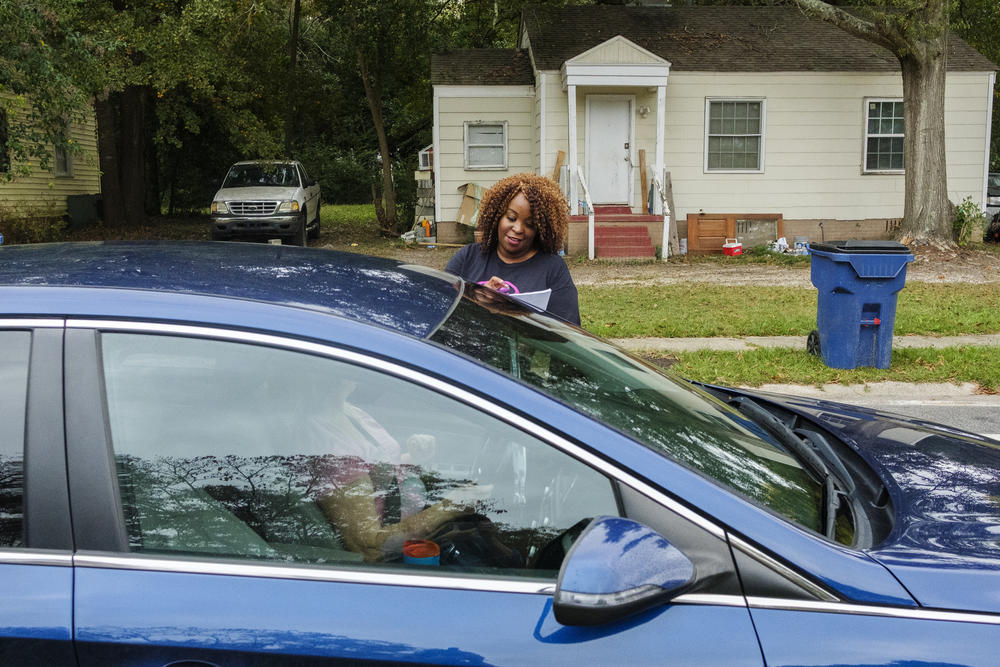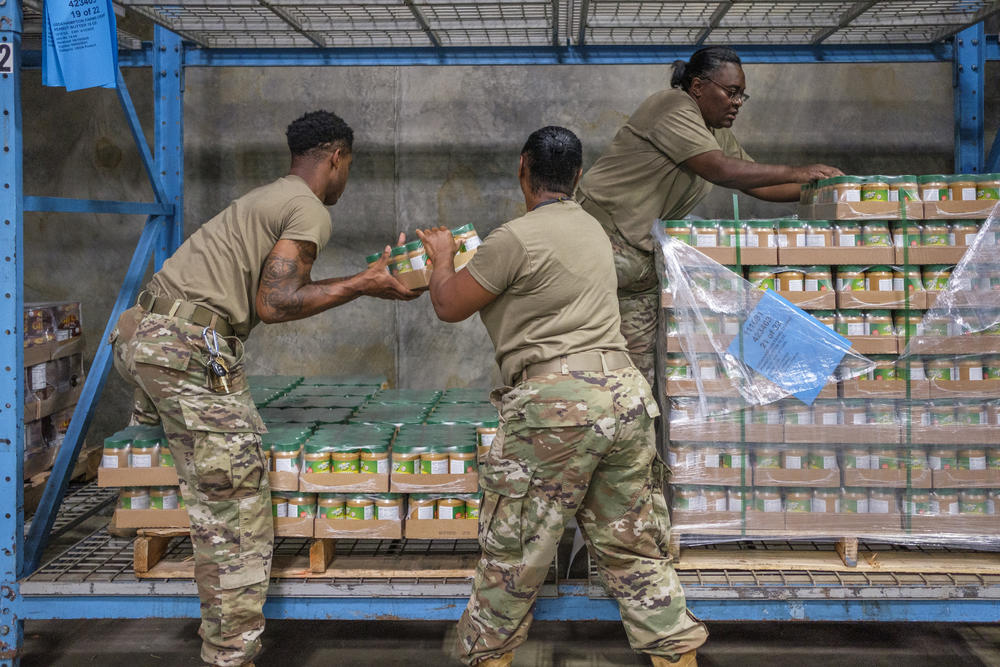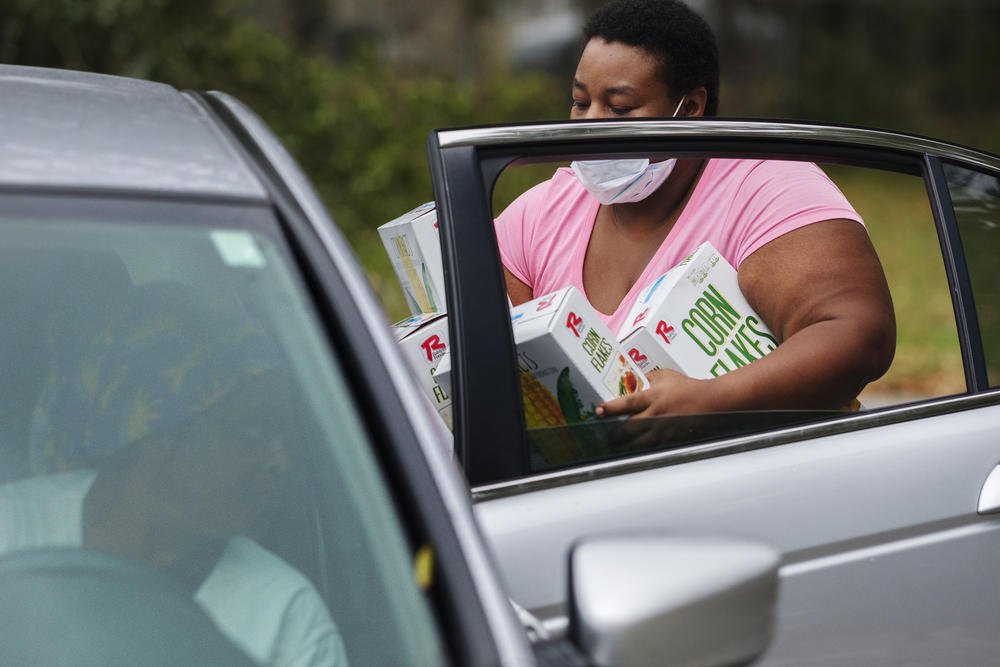
Caption
Theron Sheffield-Brown collects paperwork from a woman hoping to access food during a food disbursal organized by Sheffield-Brown and the support group Single Moms Connect, of which she is a member.
Credit: Grant Blankenship/GPB
|Updated: December 1, 2020 9:44 PM
It was one of those gray, wet and warm days that pass for fall in Georgia when, in a parking lot across from a white clapboard church in Warner Robins, the women of Single Moms Connect started packing groceries.
Down the street, cars and vans, some with their trunks and tailgates already open, were queued up along a narrow side street lined with tidy houses.
As the women put boxes of breakfast cereal, canned chicken and other staples in cardboard boxes, there was laughter and a light mood. They were clearly, literally, happy to help.
Then, they were ready to get the line moving. One after one, cars pulled through, food hit trunks, thanks and well wishes were exchanged as the women worked.
“Thank you ma’am! Have a blessed one!”
By now, you’ve probably seen photos of scenes like this. Cars lined up for blocks, or filling parking lots, with people hoping to get a little help via boxes of groceries provided by a food bank. It’s a scene that’s repeating itself in states all across the country, including Georgia.
Unemployment peaked in central Georgia’s biggest cities, Macon and Warner Robins, back in April at about 11%. Since then the unemployment rate has been steadily improving, though in Macon it’s still twice what it was this time last year. In Warner Robins, where Robins Air Force Base is the major employer, unemployment is slightly better, though still lagging 2019 numbers.
According to Feeding America, a group connecting 200 food banks and some 60,000 other food aid service organizations, demand for food aid has increased by about 60% since the beginning of the pandemic. Plus, just under half of the people seeking food aid are said to be doing so for the first time in their lives.
It turns out the nation’s food aid system is largely run by volunteers — volunteers like the women of Single Moms Connect. But just as COVID-19 is creating unprecedented need for food aid, it is also putting the squeeze on the volunteers that make the food aid system run.
Theron Sheffield-Brown organizes twice a month food disbursals put on by Single Moms Connect. She said they definitely did not slow down for the pandemic.
“Because we knew the need,” she said. “And people were out of work, you know? And they’re not getting enough hours. And I got a few kids at home. I have two boys. They eat up everything. So you need extra food in your household.”

Theron Sheffield-Brown collects paperwork from a woman hoping to access food during a food disbursal organized by Sheffield-Brown and the support group Single Moms Connect, of which she is a member.
Sheffield-Brown estimates they will disburse 800 meals provided by the Middle Georgia Community Food Bank during a Wednesday like this. She said they do more on their other disbursal day.
Most weeks, similar food aid is being distributed in 13 other places in the 27-county area the Middle Georgia Community Food bank serves. The same will be true next week, and likely the week after. The food bank publishes a weekly list of all their drive through events on their Facebook page.
Katie Fitzgerald, Chief Operating Officer of Feeding America, said it couldn’t happen without the work of volunteers.
“We rely on about two million volunteers to help capture the food, store it, repack it and distribute it,” Fitzgerald said. “And many of our volunteers in our network are older and people are making really good decisions about their own safety.”
Older people, who often have time after retirement to do charitable work, are also extremely susceptible to complications from COVID-19.
Kathy McCollum heads the Middle Georgia Community Food Bank. She came to the job in May. She says she’s seeing a massive jump in demand across her service area.
“We have reached, in the second quarter, almost three million meals,” McCollum said.
That’s a million more meals compared to the quarter before the pandemic, based on the pounds of food that have come through the food bank warehouse.
At the same time, some of her volunteers, wary of COVID-19, are staying home.
“So we went through a period of having some closures,” McCollum said.

Under the direction of Staff Sgt. Vanessa Williams, right, Georgia National Guard members pull jars of peanut butter for grocery boxes at the Middle Georgia Regional Food Bank in Macon. Guardsmen have filled in for civilian workers during the pandemic.
Some of those closures were due to volunteers staying home rather than working at the food pantries and civic groups McCollum relies on as the point of contact with the public. But labor also dried up right in the food bank itself, where workers have to deal with the vagaries of what food is coming in the door and how it gets packaged into usable grocery orders.
“We received donations of 32,000 dozen eggs,” McCollum said. "That was in my first month here and I had a hard time even knowing what that was going to look like.
But now McCollum is back up to speed. Out in the warehouse where a forklift moved pallets, a refrigerated trailer was unpacked at a loading dock and a handful of workers in olive drab military uniforms pulled enormous jars of peanut butter.
“So we've got National Guard soldiers here picking for the orders,” McCollum said. “We've got a National Guard person on the forklift. They're loading up for tomorrow's mobile pantries.”
There were seven National Guard members working alongside some new, paid regular warehouse workers. Leading the guardsmen was Staff Sgt. Vanessa Williams.
“This is what they consider to be a state emergency,” Williams said. “So when it's a state emergency, they call the National Guard. And so we go out and we play superheroes.”
McCollum said the Guard members are slated to leave by early December. In the meantime, she is adding more paid workers.

Volunteer Kenya Hampton loads groceries in the back of a recipient's car. According to the group Feeding American, just under half of the people accessing food aid during the COVID-19 recession are doing so for the first time in their lives.
Katie Fitzgerald of Feeding America said the scene that is playing out in the food bank in Macon is also playing out nationwide, it's unique to the pandemic and it comes at the start of what could be a long stretch of food insecurity.
“In the 2008 recession, we did not see food security returned to its pre-recession levels until 2018, which was 10 years after the 2008 recession,” Fitzgerald said. “So we know we're in a marathon now.”
Meanwhile, the women of Single Moms Connect will be out in Houston County twice a month, helping families make ends meet, as long as they’re needed.